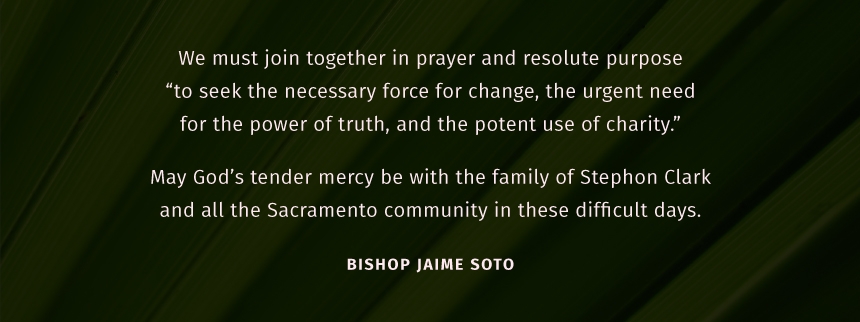
Bishop Jaime Soto delivered the homily below during Mass at the Cathedral of the Blessed Sacrament in Sacramento on Palm Sunday, March 25.
---
The image of unruly, angry mob dominated the passion narrative of St. Mark. Pilate was unable to control them and eventually ceded to them the sentence they demanded: “Crucify Him.”
As we proclaimed the gospel together, it is an uneasy, troubling feeling to repeat the angry cry of the mob: “Crucify Him.” Trying to imagine the scene, as the tragedy unfolded, we can feel helpless and maybe even complicit. We can feel the fear and shame of Simon Peter as he stood surrounded and accused by the angry and curious mob gathered around the courtyard of the high priest. Inside, the Sanhedrin was interrogating and beating his friend. While this was going on, the threatening accusation, “You were surely one of them,” must have deathly shaken Simon Peter. He thrice denied he knew the Lord.
These overwhelming scenes of restless crowds seem even more haunting as we have witnessed large gatherings in our Capital City during this past week. In one way or another people have gathered in response to the violence in our society. Some have been peaceful, others disruptive, and still others pushed to the brink of unruly mayhem. All of them have given voice to frustrations and outrage at the rising plague of violence.
Watching these scenes stirs up the fear of mimicking the violence they protest. Our gathering today, which began with our own humble march to the altar of God, should remember to pray for peaceful, respectful and candid dialogue leading to the truth, and a renewed commitment to solidarity. Our solemn inauguration of Holy Week is not an evasion of these pressing problems. The pilgrimage we have begun should lead us to the heart of both social as well as personal redemption.
Violence in any form is always disruptive and destructive. We know this from the Lord’s own commandment, the fifth commandment, “Thou shalt not kill.” Killing is always evil. It is the taking of a life that is not ours to take. We understand there are unfortunate, even unavoidable circumstances, when killing is done in self-defense, but even then it is a necessary evil. It is never good. We have seen what the evil of killing can do. It destroys lives and deeply wounds a community, wounds that often times never heal. Even when necessary, it is always tragic.
Investigations, debate, as well as more protests about the recent police killing of Stephon Clark will surely continue but we must all remember that killing – in whatever circumstance – is a destructive and disruptive action that will always yield bitter results.
Much of the debate will center around the application of necessary or unnecessary force in policing. We gather here to seek the necessary force for change, the urgent need for the power of truth, and the potent use of charity. The society for which we aspire will never come about by angry and violent force, just as the passion narrative we have just heard was not decided by the mob or the verdict of the authorities. Neither was Peter’s fate decided by his own fear and shame. He was saved by his friend who loved him till the end.
Jesus appeared powerless, hanging humiliated on the cross, while the taunts and insults berated him until his last dying breath. It seemed like a total failure yet as he expired, the one holding the weapons of torture, the one who held all the forces of power, the Roman Centurion uttered in humble amazement, “Truly this man was the Son of God.” In that moment appeared the force of mercy. In that moment, the change had begun.

